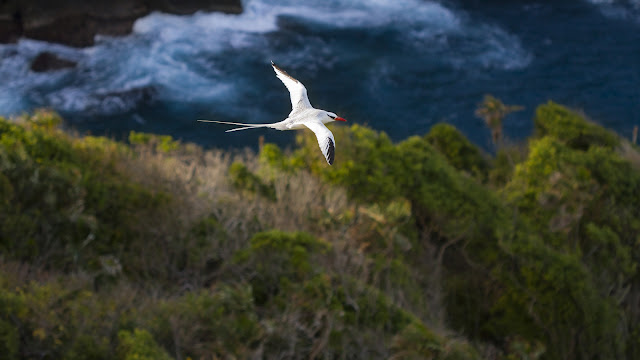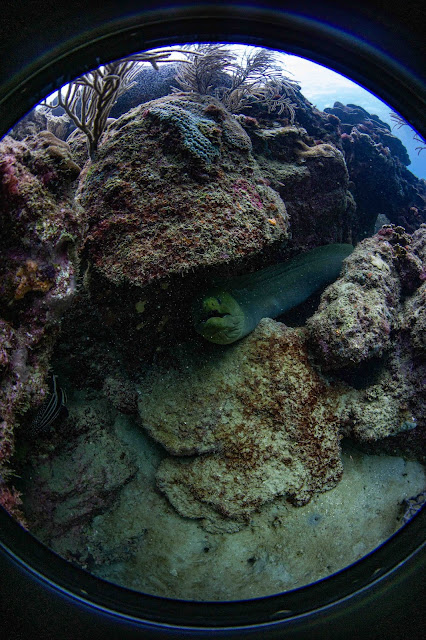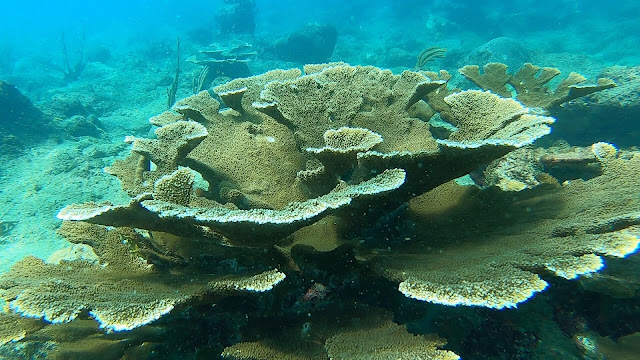The boy who nearly drowned
Anjani Ganase, Trinbagonian marine
biologist, continues her exploration of marine Tobago. In this issue, she talks
with marine scientist Jahson Alemu who is working to preserve the coral reefs
of Tobago, which serve as coastal protection as well as habitats for species
that support livelihoods in food and tourism.
Follow Anjani Ganase on twitter: @AnjGanase
“I wanted to be a marine biologist
when I learned to SCUBA dive. But my connection to the ocean started well
before that. I almost drowned once - my fault really - 11 year old + big waves
+ following friends + not knowing how to swim = problems. That was quite scary,
so I learned to swim and in the process I got exposure to ocean exploration.
But when I learned to SCUBA, it was a new world to discover. I wanted to know
everything about everything underwater.”
 |
| Jahson prepares his dive gear. Photo by Mark Pierre |
Following
his near drowning, Jahson decided he would never be in that situation again. He
joined 6th Trinidad Sea Scouts, learned to swim and developed skills
that made him ocean aware. He would go camping on beaches and snorkel along the
coast.
He
learned to SCUBA dive when he was studying for his undergraduate degree (Biology)
at the University of the West Indies. He would look for the small creatures
that made their homes in the gaps and crevices of the reef. He was always
intrigued by creatures with odd traits.
“There are lots of large and awesome
things to see under the water, turtles, corals, fish, dolphins, sharks etc, but
the odd creatures always stand out to me. They are usually small and hard to
see, plus they make some of the best photo subjects. These oddities diverge
from the typical archetype of what animals such as crabs, fish and coral should
look like, and highlight the wide diversity of creatures both in form and
function found under the sea. My personal favourite is the cuttlefish, the
master of mimicry. I really don't like eels though, so I'm glad I didn't meet
any of them when I was starting my career.”
He
graduated in 2005 and went to work with a consultancy company carrying out marine
environmental assessments on coral reefs in Antigua and Barbuda and the Tobago
Cays in the Grenadines. There were plans to set up marine parks. This was the
first time he saw other Caribbean coral reefs apart from those in Tobago. It
was also when he became aware of the dreadful state of Caribbean coral reefs
and the challenges that lay ahead. He decided to dedicate his career to not
just researching the causes of this degradation; but to figuring out what is
required to build the resilience of Caribbean coral reefs: behaviour change
among humans might be the most important.
“ 99% of the battle is influencing
human perceptions and behaviours, whether it's influencing the type or size of
fish we catch, to how we treat land-based waste/pollution. All the behaviours
impact the ocean – together - at the same time - reinforcing and exacerbating
each individual impact…”
His deep
interest led to the opportunity to do a Master of Science in Marine Biology at
the University of Bangor in Wales. Jahson studied the marine ecosystems of Mauritius
and Rodrigues in the Indian Ocean. He worked alongside the local communities to
establish marine parks. This is where he saw what the heavy dependence on coral
reefs can do to a reef. The initiative to set up marine parks was the desperate
final attempt by the local fishermen, who were aware that their reefs were
heavily overfished and needed marine management and law enforcement to allow
for recovery of fish stocks. Jahson learned the importance of protecting crucial
marine habitats that serve as important spawning or feeding grounds and the corridors
that connect the ecosystems that fish move through.
When
he returned home in October 2008, Jahson moved to Tobago to start working on
the coral reefs of his home country. He worked for the Buccoo Reef Trust for a
year as the assistant project coordinator. At the time the Trust was the only
NGO in Tobago with an interest in the preservation and conservation of coral
reefs.
He
was returning to the reefs where he had learned to dive just four years before.
Even within this short time frame, reefs at some favourite dive sites – Mt.
Irvine and parts of Speyside – were changing showing considerable coral loss
and disease. Unfortunately, there was little record of the degradation or research
into the causes. Moving forward, and recognising the paucity of data on
Tobago’s marine environment, Jahson joined the Institute of Marine Affairs as the
coral reef research officer. He set about establishing a comprehensive monitoring
and research programme for the marine environment all around Tobago. He was
also instrumental in the development of a Coral Bleaching Response Plan for
Tobago and the establishment of two monitoring stations called Coral Reef Early
Warning Systems (CREWS) at Buccoo and Angel Reef, Speyside. The monitoring
stations collect near real time atmospheric and oceanic data – ocean temperature,
wind, rain, pH and even algal levels –as part of the National Oceanic and
Atmospheric Administration’s (NOAA) Coral Health and Monitoring Program. The oceanographic
data of Tobago is stored and may be accessed at an online repository for data
from coral reefs all around the world. This data feeds into models that can be
used to predict when bleaching events are expected to happen (see below for the
link to the website).
Jahson is now working towards his PhD. He is looking at the role of coral
reefs in coastal zone planning. Apart from the biological significance of coral
reefs for tourism, food security and enjoyment, Jahson believes it is important
to “safeguard one of the most important ecosystems to island
states. Through rigorous and empirical research he hopes to demonstrate the
role of shoreline protection/ coastal erosion abatement potential of coastal
ecosystems in coastal zone planning.” Such considerations should be included in the cost-benefit
analyses associated with the evaluation of coastal development or alternative coastal
management scenarios. We'd be in a better place if this was the case, since the
decisions that affect these ecosystems, will ultimately influence our quality of
life on the island.
Jahson
works towards creating synergy between economic development and environmental conservation
that will benefit communities and their natural environment. When
asked if he believes coral reefs have a future, given all the woes they are
facing, Jahson considers himself a coral reef optimist. “Coral reefs have been around for thousands of years and
likely to be around for a bit longer. Given global trends and what's expected
to happen over the next 50-100 years, our reefs might change - we might lose
some species, new reefs may start and older ones may fade. We don't know how
they will change. Ultimately, they're having a hard time right now, due to
warming oceans, fishing impacts, physical damage, sediment and other natural
impacts that come from storms and hurricanes. Their future really depends on what
we’re willing to do for them now.”
If
you are interested in learning more about Jahson’s research or getting started
in the field of marine biology and conservation, you can email him at jahsonb@gmail.com,
and follow him on twitter: @jahson_alemu. Find out more about NOAA’s Coral
Health and Monitoring Program (CHAMP) here: http://www.coral.noaa.gov/champportal/



